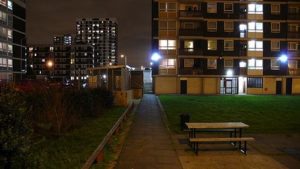You have no items in your cart. Want to get some nice things?
Go shopping
I gain entry to St Raphael’s estate, the way ice passes over sore skin. I’m jumpy, and walk past Polish men sitting comfortably on a low brick wall, drinking heavily in the afternoon. There are cuts on their fingers; paint on their clothes. They wear luminous Hi Vis work jackets, and sit propped like puppets on a bench, watching me intensely as I walk by. The field leading from the train station binds the estate, and shows me the way like an older sibling. It’s a constant spectator to my casual walks in the spring, when I take one of the many long routes home, when the weather’s decent.
The sun on these days squints, as if unsure of the estate and its dealings, scrutinising its nomadic residents to work out if they are worthy of too much, or nothing at all. Anything in between is too strenuous for the estate. It’s too much to bear, as St Raphael’s is only used to extremities or hunger, nothing less. To owe the sun, too, reminds it of the colour yellow during blue times. To be in debt to a star is to feel even smaller than its multicultural residents already do.
The estate is mistrusting and wants to know what the catch is, always. It exhibits this in the way the curtains twitch, the way the front doors of its flats sit on the lip of the small roads that swerve through its insides. It’s in the brickwork, the layered homes performing a united front through assumption. The doubt and accusation sleeps in the rusty grey of the wiry fences, in the aura of the pet bulldog security guards, and it’s clear when signposting strollers to ‘BEWARE’ in sunflower-yellow paint.
I feel the fleeting heat as I make my way home. It’s deliberate, and owes nothing to these russet box homes that pierce the air so high, and, to my eyes, it’s testing. But this place does not care, and it’s demonstrated in how old and strong its cladding bones are; the waft of incense I smell coming from number 62, and through the smell of weed that just won’t let up.
I’m searching for slight shade, and walk swiftly past the skater boys who ride their boards weak. They flip them and inhale smoke deeply, as if cursing their passersby who cruise down the highway that flanks their play area. The word ‘Jesus’ is spray painted in fancy cursive graffiti on the slope, as if asking for help when mid-air. The boys’ board and hand interchanges are explosive, and scream urban anger. I watch a genesis of young boys seeking finality on a half-finished road that their fathers could not walk.
Near the small bridge, I notice that the crows harass the residents, the way cliques in prison take over outdoor areas. Observing their actions closely, I see that even their thoughts come across as dark, their eyes a moody space blue. The crows attack the seagulls who have sailed in from God knows where. They bully the kind pigeons who stand back leaving the almost invisible bread crumbs to them, and the brown squirrels whose colour has deepened due to the hardship of a lifetime of foraging and eating budget food. I’m sick with worry, because crows prey on the weak one in the group. I wonder who would be preyed upon in my circle if we were crows. Would it be me? I notice one who doesn’t bully as much, with a weak wing. He is living as a part of a consequence.
The dirty river meanders through the field and offsets the kind and crisp cut grass that’s been invaded by daisies. The ducks look flattened by the brown water, afraid of the Ikea trolley and the large tyre lodged among the currents and junk. I walk over the bridge, thinking how the water looks hungry, and how the ducks convey their dehydration through staggered quacks.
I’m in no rush to get home, but I am. I stop to take photos of the newly blossomed pink trumpet tree ahead when I turn left. It’s taken me, in all its pink hue. I’m transported, and now sitting up in its lap, bound among the colour; the solitude similar to the silence you’re often awarded when studying. I Google the stages of decay in flowers. That’s where my mind has been. In the beauty of deterioration; the idea that in nature as opposed to everything else, there’s relief in decay. It means a fresh start, and coming apart means renewal. In St Raph’s, coming apart is falling apart, and staying down. It means depression.
I’m distracted suddenly, because on the nearby basketball court, Somali boys are hollering and dillydallying. One of them has his jogging bottoms low, his inexpensive underwear peeking through. He stares at me as if I don’t belong under a lovely tree. Another teenager is overweight and wearing sandals. They both sweat and dribble the ball then laugh, with no intention of responding to their mother’s yelling, or to the world, a place with no intention of responding to them. Instead, they respond to St Raph’s. They consider it, laying their clothing on its body, using its build and calling dibs on its curves and corners. I note that these kids have lost focus, and are preparing to gain it back through sport. The ball holds their fears so they shake it, whack it around, and swear. Slang is their meaningful speech, shortened to grunts and unspeaking; because speaking, really speaking is too telling. It tethers them to reality, to experience, and to really look at their surroundings. To look at St Raph’s, and understand if this is them; if they are built for this concrete jungle.
I notice the building behind the basketball court, where we vote and nothing changes. Children are taught to speak and dream in that building, also. To gather what they can, and go home and dream, only to come back here in the a.m. I continue down the long, winding pavement, past so many more flats and playgrounds and large dustbins. I smell a stench that makes my eyes water. It’s an oversized jar of pickles. Beside it is a twin jar of rotting plum tomatoes that challenges the pickles’ distinguished whiff, outdoing it. A black cat sniffs it, running away panicked; caught off guard by the odour lingering on its sweet button nose. There are dump piles here, bed boards, broken tables; chairs missing legs and the recycling bins are bursting with coloured glass bottles. There’s a living doom about this strip of flats, reminiscent of the Monday blues. A persistent gas smell confirms it, as if pleading that a fire be lit.
A chubby girl rides her scooter in circles, the velcro on the sandal around her ankle flagging. A small baby is pushed on the swings in the park by a mother. The young woman thoughtlessly shoves her child away from her body at intervals, which race ahead of the swing’s unique rhythm. She does this as if it’s therapeutic to her thinking, as if for those three seconds, while her child is mid-air, she is free. She simultaneously secures her hair, using her long nails as a comb, then lifts her locked phone to use as a mirror. Self-reflection in the dark is equal to fermenting.
The estate softens once I hear my sandal-clicking has slowed, and small rocks pierce my feet. I reach the island that our big house sits on. Its brighter, peach-coloured and contemporary. The youthfulness of the materials, the cleanliness of the exterior windows, the fake hedges and the large roof is modern art to this estate that’s filled with block colours and cage-like designs. Our house looks sensitive in comparison to the older flats. Its looks worried in the morning shadows, the goody-two-shoes in a classroom full of rebels. We and our neighbours are seen as naïve, inexperienced tenants who missed the drug heists, the police raids and arrests of ’09. This is St Raphael’s improved. God help us all.

About Idman Omar
Idman Omar is a MA Creative Writing student at Birkbeck University, London. She writes cultural pieces on her website alittlemisty.com. She a film junkie, whose favourite writer is Durga Chew-Bose. Follow Idman on Twitter and Instagram on @littleladyiddy.
- Web |
- More Posts(1)



